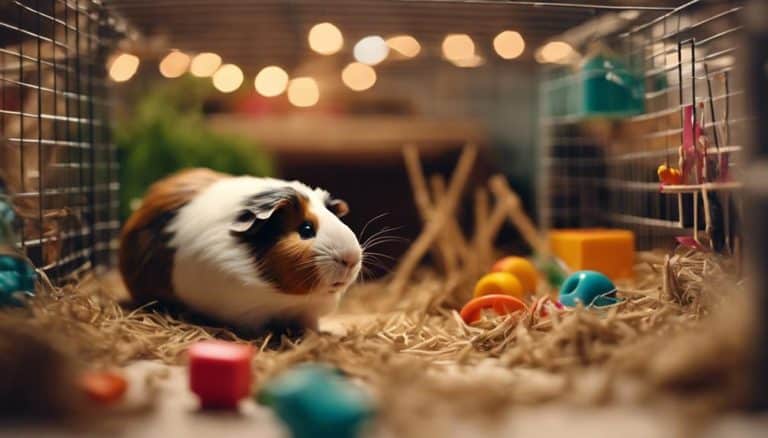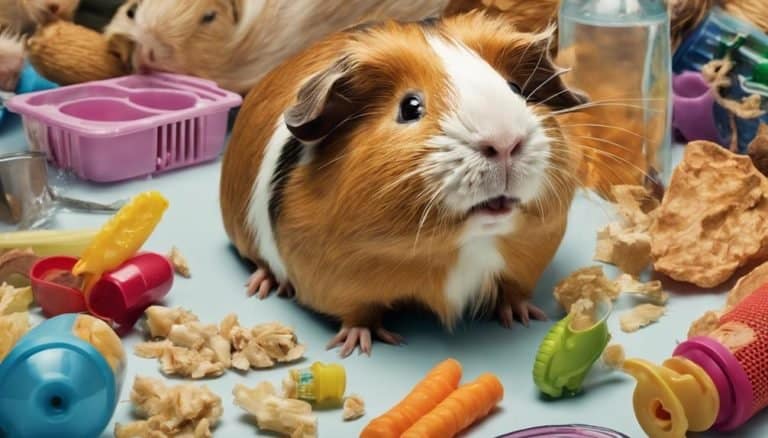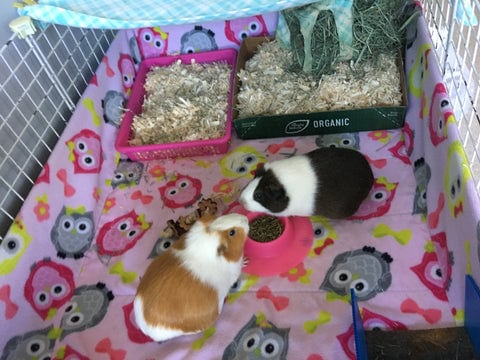Are guinea pigs good pets? The answer may surprise you
Guinea pigs can make great pets. They are small, gentle, and easy to care for. Guinea pigs are often quite friendly and curious and enjoy being handled by their owners. They also require minimal space, so they’re great for those without a lot of room in their home or apartment.
Additionally, guinea pigs need only basic supplies such as food, water, a cage, hay, and bedding. With the right care and attention, guinea pigs can make rewarding companions that will bring years of joy to your life. The answer may surprise you – yes, guinea pigs can be amazing pets!
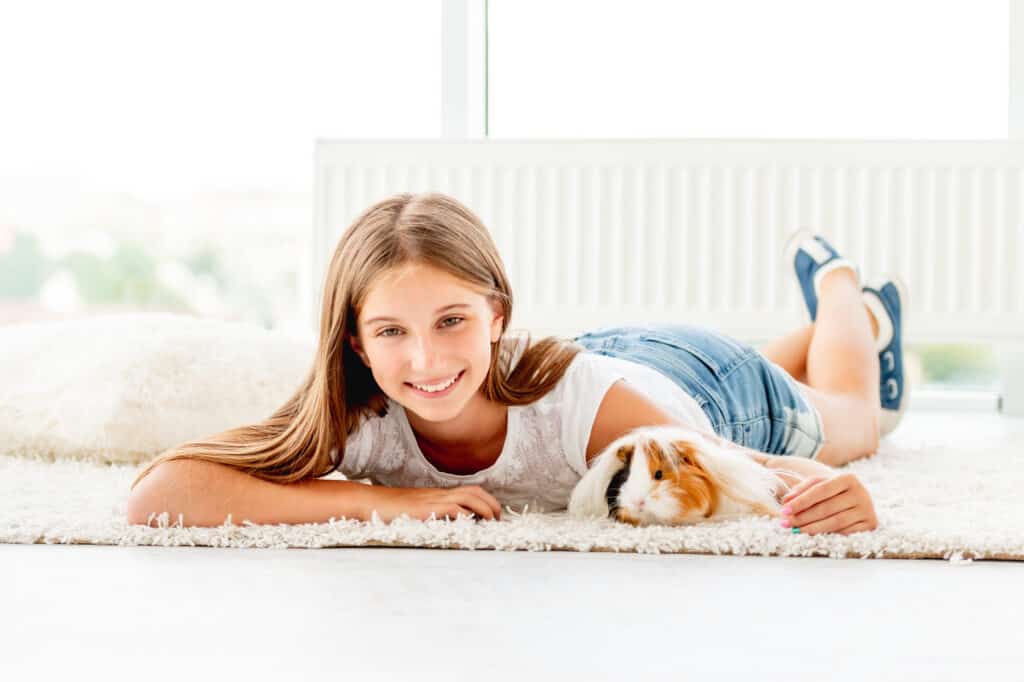
Are Guinea Pigs Easy to Care For?
Guinea pigs are an easy pet to care for and make great companions! They require a bit of daily attention, but the rewards of having a guinea pig as a pet far outweigh the dedication needed for their upkeep.
Guinea pigs need fresh food, water, bedding and plenty of exercise each day. Regular brushing helps keep their fur healthy and protects against mites or other parasites. Proper nutrition is essential to keeping guinea pigs healthy; they should be fed hay, vegetables, and pellets that are specially formulated for them. With the right environment and care, guinea pigs can easily live up to 8 years.
Overall, guinea pigs are easy to care for if you take the time to understand their needs and provide them with adequate nutrition, housing, exercise, love and affection.
Is a guinea pig right for your family?
A guinea pig can make a great addition to your family. Before you get a guinea pig, it is important to do some research and ask yourself some frequently asked questions.
Are you able to provide the necessary space, bedding, and food for one?
Do you have enough time to devote to this small pet?
Can all members of the family commit to daily care and maintenance?
If the answer is yes, then a guinea pig may be right for your family. Guinea pigs are social creatures that require companionship, so consider getting two if possible.
They are relatively easy to care for and provide lots of love in return. Consider all aspects before making a decision on whether or not a guinea pig is right for your family.
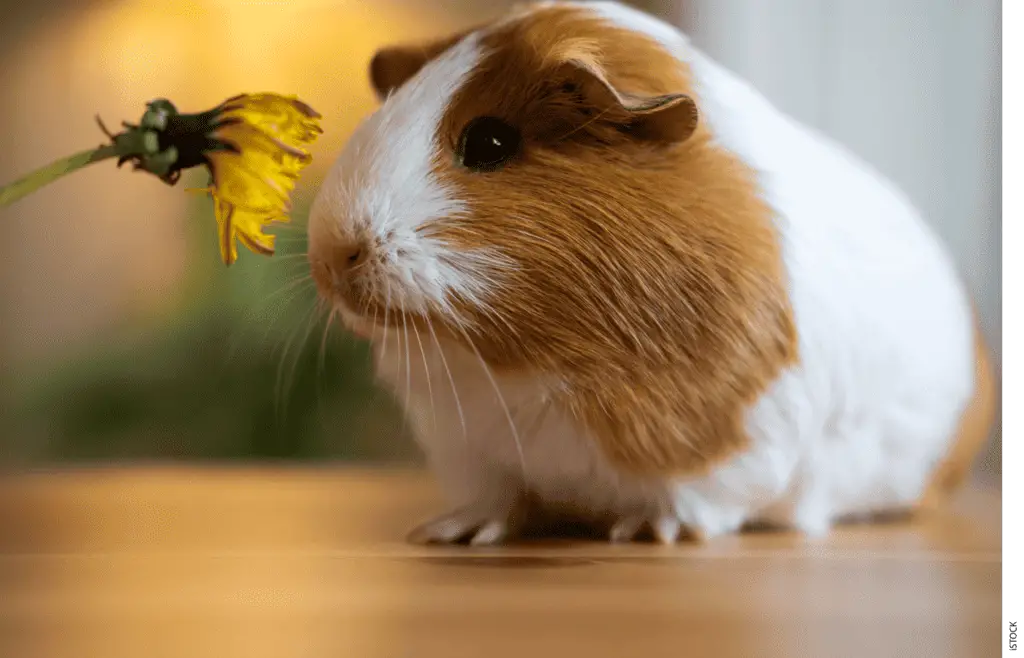
Do Guinea Pigs Make Good Pets?
Guinea pigs make good pets and many people enjoy having them as part of their family. They are smaller than a hamster, but they are still plenty of fun to have around. Guinea pigs have sweet personalities and can make great pets for children and adults alike.
There are a few reasons why guinea pigs make good pets – for one, they require little maintenance, so you won’t need to spend too much time taking care of them. Additionally, they don’t take up very much space in your home, so they’re great if you live in an apartment or other small living situation.
Finally, if you’re looking for a pet that is relatively low-maintenance and also loves to cuddle and play with you, then guinea pigs as pets might be the perfect choice!
Can guinea pigs live alone?
Guinea pigs are social animals and they live in groups in the wild. Therefore, it is not recommended to keep a single guinea pig alone as they will not be able to interact with another animal or their own species.
When deciding on a pet, it is best to consider getting two guinea pigs so they can interact with each other and provide companionship. As long as there is enough space in the cage for both guinea pigs, they should be able to coexist happily.
If you are unable to get a pair of guinea pigs, then you should make sure that your one guinea pig gets plenty of social interaction from its human companion. You should also ensure that the environment of the cage has enough stimulation such as toys or tunnels that can help keep them occupied while they are alone.
Guinea pigs may become lonely if kept without another guinea pig for too long, so it is important to provide them with company either from their own kind or from humans.
Can guinea pigs live outside?
Many guinea pigs live outside in their natural habitats, but they may not be able to survive the cold or hot weather.
It is important to keep your guinea pig in an environment that is warm and safe if you plan on keeping them as a pet. Guinea pigs are very sensitive when it comes to temperature and can easily overheat or become too cold if not taken care of properly.
If you live in a place where temperatures fluctuate often, it’s best to keep your guinea pig indoors where you can regulate the temperature. Outdoor enclosures are available for those who want their guinea pig to enjoy some time outdoors, but make sure it is secure and properly insulated so that your guinea pig will remain safe and comfortable. With proper care, many guinea pigs can have a healthy life both inside and outside.
What should you do if a guinea pig is sick?
If your guinea pig is sick, it is important to take them to the vet as soon as possible. At the vet, they can assess and diagnose what’s wrong with your guinea pig, and provide the necessary treatment.
Keeping your guinea pig healthy requires regular check-ups at the vet, a good diet, and plenty of bedding and fresh hay. Additionally, make sure they have a clean living environment and are adequately socialized.
If you notice any changes in their behaviour or health such as lethargy or lack of appetite, it’s important to seek medical attention right away.
Regularly cleaning their cage and providing them with fresh food and water can help prevent illnesses from occurring in the first place.
Taking care of a guinea pig is not an easy task; however, if you follow these guidelines for keeping your guinea pig healthy, you should be able to keep them happy and healthy for years to come.
What cage should a guinea pig live in?
When keeping guinea pigs, it is important to provide them with a suitable cage. It should be large enough for them to move around freely and have plenty of space for bedding.
A good size for one guinea pig is 24″ x 48″ with a height of at least 14″. If you are planning to keep two guinea pigs together then the cage should be even bigger. You can find suitable cages in pet stores, or alternatively you can make your own.
The bedding should also be changed regularly, as guinea pigs need a comfortable and clean living environment. When choosing your cage make sure that it is easy to access and does not have any sharp edges that could harm your pet.
By providing your guinea pig with the right kind of cage, they will be able to live happily and healthily in their new home!
Guinea Pigs Need Time to Get to Know You
If you are looking to bring two guinea pigs into your home, it is important to remember that they will need time to get to know you. Guinea pigs are highly social animals and will take time to adjust to their new environment and form relationships with their owner.
While some guinea pigs can be very friendly and outgoing from the start, others may take longer before they are comfortable with being handled or cuddled. It is also important to remember that different guinea pigs have different personalities so it is important not to expect them all to warm up at the same rate.
To ensure that your guinea pigs feel safe and secure, try spending quality time with them regularly in a calm environment. This can include gentle petting, playing with toys, or even simply sitting nearby while they explore their cage.
With patience and plenty of love, your two guinea pigs will soon learn that they can trust you and you’ll be able to enjoy many happy years together.
Guinea Pigs Should Always Be Adopted as a Pair
Having two guinea pigs also stimulates them mentally by providing them with more opportunities for interaction, play, and exploration. Additionally, having two guinea pigs benefits their physical health since they can groom each other, helping keep their coats clean and tangle-free.
When adopting one guinea pig, it is important to remember that you will have to give it more attention than if you adopted a pair.
Also, bear in mind that the cost of adopting two guinea pigs is likely less than buying one separately as most shelters offer discounted rates for pairs of animals. Adopting a pair of guinea pigs is definitely the way to go for any pet owner looking for long-term companionship!
Guinea Pigs Are Social
Guinea pigs are social animals and they love to have companionship. Guinea pigs are very social and they thrive when they have the opportunity to interact with other guinea pigs, or even humans.
Pigs are very social animals as well, so if you decide to get a guinea pig it is best to get a pair. Having two guinea pigs living together will help them feel secure and provide them with lots of opportunities for playtime and cuddles.
Guinea pigs are also known to bond with their owners, so if you spend enough time interacting with one or two of them, you may find yourself becoming friends with your furry little companions!
Guinea Pigs Are Generally Easy to Tame
Guinea pigs are generally easy to tame, although they may be skittish at first. With time and patience, they can become comfortable around humans and even develop a bond with them.
An important part of taming a guinea pig is getting them used to being handled. Start by simply petting your guinea pig while speaking in a gentle voice or giving it treats. Once your guinea pig is comfortable with being handled, you can begin to pick it up.
Be sure to move slowly and don’t squeeze too tightly as this could scare it. As you continue taming your guinea pig, try introducing new environments and people for it to get used to.
Providing toys and hideouts for the guinea pig will help it become more relaxed in its environment as well. Eventually, your guinea pig should learn that you are a trusted companion who brings comfort and safety instead of fear or discomfort.
5 Things to Consider Before Getting a Guinea Pig
If you’re thinking about getting a guinea pig, there are some important things to consider. First, you should decide if you can commit to the lifetime of care that a guinea pig requires.
They can live up to 10 years so it’s important to make sure that you have the time and resources necessary to provide them with a healthy and happy life. Second, you should think about the space that you have available for your pet.
Guinea pigs need plenty of room – at least 2 square feet per guinea pig in their cage – and access to exercise areas outside of the cage.
Third, you need to research what kind of food is best for your pet and make sure you have supplies available to feed them properly.
Fourth, it’s important to consider your budget; guinea pigs require regular veterinary visits as well as supplies like cages and bedding which can add up over time.
Finally, make sure your family is on board with getting a new pet; everyone should be aware of the responsibilities involved in owning a guinea pig before taking on this commitment.
Pros of Owning Guinea Pigs
One of the pros of owning guinea pigs is their long lifespan; typically they can live for 5 to 6 years, however some may even reach 8 or 9 years old. The characteristics of guinea pigs make them great companions and they make great family pets too.
Common activities for guinea pigs include playing with toys, eating vegetables and fruit, running around in their cage or being handled by humans. All these activities make them fun pets to own and their cheerful nature means they will provide plenty of entertainment for all of the family.
Overall, the pros of owning guinea pigs far outweigh any cons and they are a wonderful choice for anyone looking for an interesting companion animal.
Cons of Owning Guinea Pigs
If you’re thinking of owning a guinea pig, also known as cavy, there are some cons to consider. Guinea pigs are very skittish and can be easily startled, so they require a secure cage with plenty of space to explore and hide.
They also need lots of hay and bedding to stay comfortable. Additionally, guinea pigs can make quite a bit of noise, especially when hungry or scared, which can be disruptive for some people.
One other thing to consider is that guinea pigs are very social animals so if you are not able to give them the attention they need then it may be better to consider adopting two instead of one.
It is also important to note that guinea pigs have a relatively short lifespan of 4-7 years so you should be prepared for the commitment involved in taking care of your cavy over its lifetime.
What Do Guinea Pigs Eat
The guinea pig is a small rodent that has been domesticated since the 16th century. As a breed, they require a balanced diet to stay healthy and happy.
Hay should make up the majority of a guinea pig’s diet as it provides essential vitamins and minerals, such as vitamin C and fiber. Additionally, guinea pigs need pellets that are specifically designed for them. These pellets provide proteins and fats essential for their growth.
Treats can also be given in moderation but should not make up more than 10% of their daily food intake. Fresh vegetables are important too, as they provide additional nutrition including antioxidants, vitamins and minerals which all contribute to the overall health of your guinea pig.
Always ensure that fresh water is available for your guinea pig throughout the day.
How to take care of your guinea pig
Taking care of a guinea pig is a rewarding experience, but it’s important to understand the needs of these small rodents. Guinea pigs require fresh hay and water daily, as well as a balanced diet that includes fruits and vegetables.
It’s also important to provide your guinea pig with regular exercise, as well as plenty of toys and hideaways for them to play with. Additionally, guinea pigs should have their cages cleaned on a regular basis and should be handled gently when picked up.
Make sure that your guinea pig feels safe in its environment by providing them with plenty of hiding spots from predators or other pets in the home.
With proper care and attention, you can ensure that your guinea pig will stay healthy and happy for years to come!
Guinea Pigs Need a Large Cage
When owning a guinea pig, one of the most important purchases you need to make is a large enough cage for your pet. Guinea pigs need plenty of space to move around and explore, so it’s important to provide them with an environment that allows them this freedom.
A good rule of thumb is that the cage needs to be at least seven square feet for a pair of guinea pigs. The best cages are those sold in pet stores as they are designed specifically for guinea pigs and come with all the necessary features, such as ramps and hiding places.
When buying a cage, make sure that it has enough room for two or more levels, so that your guinea pig can have plenty of options when it comes to exploring their new home.
Additionally, always check that the bars aren’t too far apart and that there is no risk of your guinea pig escaping or getting stuck between the bars. With these tips in mind, you can ensure your pet has a safe and spacious cage to enjoy its life in.
Washing Guinea Pig Bedding in Your Washer
When it comes to washing guinea pig bedding, it is important to keep the cage clean and hygienic since guinea pigs require a clean environment.
Bedding should be changed every few days and washed weekly in order to keep your pet healthy. To wash guinea pig bedding in your washer, use a mild detergent on a gentle cycle with cold water. Make sure to rinse out any soap residue before putting the bedding back in the cage as excess soap can irritate guinea pigs’ skin.
Once you have finished washing and rinsing off the bedding, it is recommended that you hang it outside or set it in the sun for an hour or two to completely dry out before returning it to the cage. This will help ensure that your guinea pig has a safe, clean, and comfortable home.
Consider lifespan
The lifespan of a guinea pig is typically five to seven years. Comparatively, hamsters and gerbils live shorter lives, usually one to three years. However, with proper care, these animals can often live longer than the average lifespan.
A healthy diet and frequent veterinarian check-ups are essential in helping these small animals live the longest lives possible. In addition to providing proper diet and medical care, providing plenty of toys and activities for your pet can also help them stay healthy and happy throughout their lifetime.
With enough love and attention, you can help your guinea pig or other small pet enjoy a long life full of happiness.
Guinea Pig Diet
A guinea pig’s diet is integral to its health and wellbeing. It is important to feed your guinea pig a balanced diet that meets their nutritional needs. Guinea pigs require hay as the main component of their diet, as hay is high in fiber which helps with digestion and keeps them full longer.
Along with hay, guinea pigs should be given fresh vegetables and small amounts of pelleted food. Pelleted food is specifically designed for guinea pigs and contains vitamins and minerals necessary for their good health. To ensure a balanced diet, offer a variety of fresh vegetables such as dark leafy greens, cabbage, carrots, celery and broccoli.
Treats such as fresh fruit should be fed sparingly as they contain too much sugar for guinea pigs. By providing your guinea pig with the right balance of hay, pellet and fresh vegetables you can help keep them healthy and happy!




